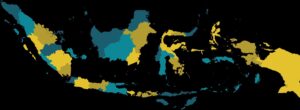Easiest European countries to live in if you don’t know the language
3 min readSome of Europe’s most popular destinations are the most challenging to live in if you need to speak English.
Learning a new language doesn’t happen overnight, so many people choose to move to a different country while still trying to master its native tongue.
With English being the world’s most common second language, it’s often the de facto fallback while you’re still learning.
So where in Europe will you be best understood – and in which countries do you need some local language proficiency from the get-go?
Each year, global education company Education First (EF) pulls together the top (and bottom) countries when it comes to English speaking in its English Proficiency Index (EPI).
Analysing the results of 2.1 million non-native English speakers who took EF’s Standard English Tests in 2023, it gives each country a ranking out of 800 points.
This year, the results showed a general decline in English proficiency, with women and students having the weakest skills.
Here’s how Europe fared in 2024.
Which European countries have the best English language skills?
In the 2024 results, nine out of 10 of the most English-proficient countries in the world are European.
As in 2023, the Netherlands once again took the top spot with 636 points, having the best second-language English skills both in Europe and of 116 countries globally.
But there are plenty of other places in Europe where you’re likely to be understood if you speak English.
Also among the top countries boasting ‘very high proficiency’ were Norway, which made it to second place globally with 610 points and Sweden, which took fourth place with 608 points.
Croatia, Portugal, Denmark, Greece and Austria made up the rest of the top level category.
European countries with a ‘high proficiency’ in English included Germany, Romania, Belgium, Finland and Poland.
France’s English skills continue to decline
Some of Europe’s most popular tourist destinations, however, only have ‘moderate proficiency’ in English.
France has dropped down the scale since 2021, when it sat in the ‘high proficiency’ category in 31st place globally. In 2022, it dropped to ‘moderate proficiency’ with 541 points, placing it 34th.
Last year, it fell to 43rd place globally and 34th in Europe, with 531 points. In 2024, it has dropped still further to 49th place globally with 524 points – the lowest of all Northern European countries included in the study.
Italy only comes in a few places above France in 46th with 528 points while Spain sits at 36 with 538 points.
They were beaten by Georgia and Belarus, in 34th and 35th place globally. Other European countries in the ‘moderate proficiency’ category include Moldova, Albania, Russia, Ukraine and Armenia.
Places where you might really struggle to be understood include Türkiye (65th) and Azerbaijan (86th) – both of which fall in the ‘low proficiency’ category.
Despite ranking lower than many European countries, Spain and France’s capital cities make it into the ‘high proficiency’ category – Rome sits lower in ‘moderate proficiency’.
Europe’s English skills are in a slump
EF has been monitoring trends since the publication of its first EPI in 2011.
Despite Europe dominating the top of the index, it found that the continent’s English skills have slumped this year, with 60 per cent of countries reporting slightly lower scores than last year.
On the positive side, the long downward youth proficiency trend in the 18-20 cohort halted this year.
Gender gap in English proficiency persists
Since last year, women’s English proficiency remained stable while men’s declined, which has narrowed the gender gap.
However, in 40 countries, men’s English proficiency is still significantly higher than women’s.
Africa remains the exception as the only continent where women have consistently better English skills than men, and women’s proficiency improved the most.
Worldwide, the gender gap is widest among the youngest cohort and narrows progressively over time.


